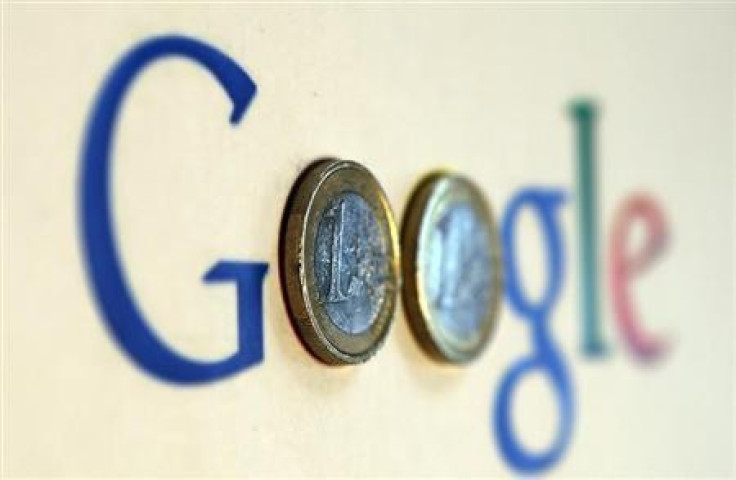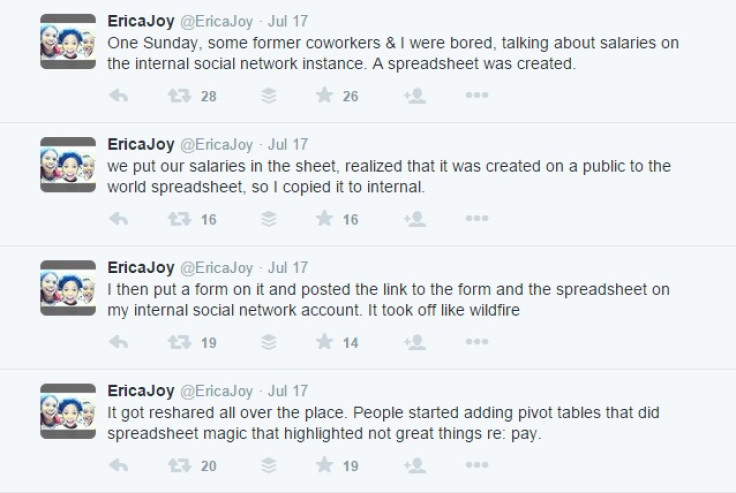Google worker claims her bonuses were blocked for exposing pay inequality

A former Google employee claims she had her bonuses blocked by management after creating a crowd-sourced database revealing pay inequality.
Erica Baker, who worked at Google for nine years in various software engineering roles, created the shared spreadsheet with some former co-workers during a Sunday afternoon at work. During a lengthy stream of tweets, Baker, who now works at messaging app Slack, revealed how the document "took off like wildfire...it got re-shared all over the place" and was added to by thousands of Google staff.

"People started adding pivot tables that did spreadsheet magic that highlighted not great things re: pay," said Joy, without explaining what these "not great" things are.
Before Baker left the search giant in March 2015, she said "around 5%" of Google's 50,000 employees had added their salary to the document. With so much data now in the open, employees feeling short-changed found it easier to ask for - and get - pay increases.
Letting all employees know how much their colleagues are being paid is a strategy employed by startups like Buffer and SumAll, but Baker found Google was not interested in joining this small but growing club.
"I was invited to talk to my manager," Baker recalls. "Higher up people weren't happy. [My manager] wasn't happy. Why did I do it?"
An important thing I learned during that time: peer bonuses are rewarded at managers discretion. My manager was rejecting all of them.
— EricaJoy (@EricaJoy) July 17, 2015Although Google couldn't act on what Baker had done, she found that $150 employee bonuses which Google staff can give each other for good work were not getting through. Colleagues were trying to give the tips to Baker for creating the spreadsheet - colleagues who had received pay increases as a result - but these were being blocked.
"Peer bonuses are rewarded at managers' discretion. My manager was rejecting all of them... once a PB is rejected, that can't be undone.," she tweeted, claiming a male colleague who worked on the spreadsheet was still receiving his bonuses.
Seven bonuses were rejected and only one got through several months later, and because Baker says the sender worded it "in a way that was very vague". Although she has now left Google, Baker handed ownership of the spreadsheet over to a colleague, so as to prevent management from getting hold of it.
Before I left, about 5% of former co. had shared their salary on that sheet. People asked for & got equitable pay based on data in the sheet
— EricaJoy (@EricaJoy) July 17, 2015At the time, Baker kept quiet about the blocked bonuses and urged her male colleague to do the same. But in the wake of positive reaction to Google's doodle featuring African-American suffragist Ida B. Wells, she decided to speak out about her experience.
Baker concluded her Twitter monologue: "Fighting for justice and fairness inside Google doesn't go over well. Salary sharing is only one example... guaranteed that if Ida Wells were alive and working at Google today, there's be many private calendar meetings focused on 'her future' there... the sharing of one doodle does not a bastion of support for justice and civil disobedience make."
© Copyright IBTimes 2024. All rights reserved.






